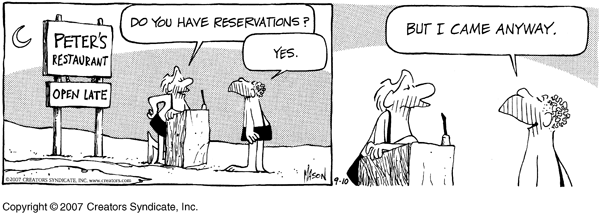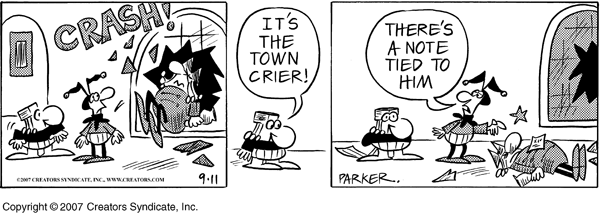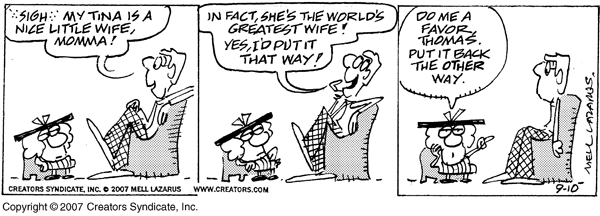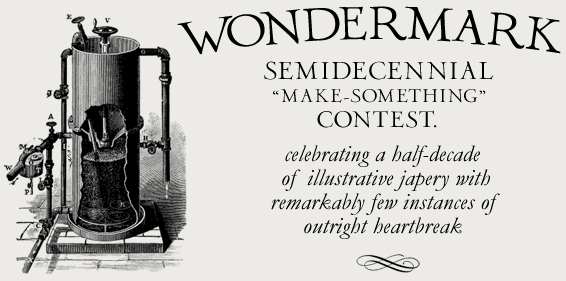
(Click any of the smaller images to zoom in on them.)
The Comic Strip Doctor is done. Sadly, it’s not because my job is finished; newspaper comics today are largely as insipid as ever. For better or worse, though (pun intended), I don’t regularly read newspaper comics anymore, and as I told my CSD mailing list, digging through online archives searching for the worst examples of Ziggy just so I can write a column isn’t how I want to spend another Saturday, ever.
Besides, there’s enough snark and commentary out there without me adding my blowhard opinion into the mix. I was prepared to let the whole matter drop and call it a day, but then I had an interesting weekend, which inspired me to write one final column. Instead of lashing out with personal attacks or taking anyone to task, I’m going to allow some of those whom I’ve (fairly or unfairly) maligned to speak on their own behalf, and leave any judgments to you, the reader.
Over the weekend, I read a book called Your Career in the Comics, by Lee Nordling. I recommend it highly as an introduction to the nuts-and-bolts business of syndicated cartooning. Less an actual written book than an edited series of interview snippets, Your Career in the Comics gathers the collected opinions of Charles Schulz, Bill Watterson, Jeff MacNelly, Bill Amend, Scott Adams, and many other cartoonists I highly respect…as well as Mell Lazarus, Johnny Hart, and a few others whose work I’ve spoken critically of in this column.
All in all, it’s a strikingly comprehensive look at the business and lifestyle of syndicated cartooning, and though some of the information is a bit dated (the book was published in 1995, and thus, says next to nothing about the Internet, which continues to transform the industry), it’s still a great window into the minds of the people who made the system work for them. Also, as far as I can tell, the material is exclusive — Bill Watterson, who famously hasn’t given many interviews, speaks at length in this book, and while his insights largely mirror other material that’s been published elsewhere, it’s still interesting to read his thoughts (at a point at which he had not yet officially retired, but was clearly considering it).
While the pros’ opinions differ on many points, the consensus is that in order to succeed, an artist must be extraordinarily dedicated and must produce good work. With respect to comic creators who’ve been working for decades (and many of whom practically died at the drawing board after working in comics their whole lives), it’s hard to question their dedication (with the exception of Mell Lazarus, who validates my opinion of him by coming off as a scribbling hack). As for quality, however — the book quotes syndicate executives who bemoan the dearth of good material that finds its way to their desk. But if I sent in Momma as a submission to United Features today, do you think I’d get a contract?
After reading the book this weekend, I then read the Sunday comics, and talk about whiplash! In Your Career, creators, syndicate execs, and newspaper editors explained to me for over two hundred pages how important it is to create quality product. The art has to be exceptional, I was told. The characters have to be relatable. The dialogue has to be snappy and the punchlines have to be consistently hilarious. The only comics that make it in this cutthroat business, I was told, are the very best of the best of the best.
Perhaps my standards for quality are too high, but when I turned from the talk about what comics have to be to the newsprint where I saw what comics are — I felt lied to.
The point of this column has never been just to make fun of bad comics, but to try and tell you that you shouldn’t settle for crap. If you’re a critical reader, turn to webcomics. Put down your newspaper. Follow the good syndicated strips online. Don’t support bad strips with your wallets. Newspaper people wring their hands over the continuing death of their beloved medium. But all I have to say in response is, “Well, duh.”
And if you’re a comic creator — do as the pros say, more then as they do. Namely, make better comics. Garfield is funnier today, three years after I called it out for being awful, than it has been at anytime in the last decade. There is always still hope.
The late Johnny Hart, on page 13 of Your Career in the Comics, perhaps put it best:
I think our challenge is to elevate the integrity of art and humor in the industry.
There is a certain thing that has been established throughout the years. Each artist copies the last artist and improves on the style, and it gets better and better and better. At least, I think that’s what the challenge should be, to try and uphold what has already been done and to improve on it, lend to it, add to it, refine it.
Hart has since passed away, yet his comic continues, assembled by his daughter and grandson using art from old episodes of the strip. It’s a bizarre backwards time-capsule of irony, or something. His words, a decade old, are no less true for his estate’s utter disregard of them, but it works backwards too: his strip — his legacy! — is no less dumb for his having had some potent insights.
Below I’ve reproduced some further quotes from the book and juxtaposed them with the comics created by the speakers of the quotes. You be the judge of how well they (or their estate) follow their own advice.
The comics I’ve selected to reprint are just the current comic at the time of my writing. I haven’t hunted for particularly good or bad examples. They just are what they are.
Mort Walker (Beetle Bailey):
…I find I write myself into a corner, and I can always come up with a funny solution. You don’t know where it’s going, when you start, and it works real well. I can sit down and do thirty ideas a day, without any trouble at all. They’re not all good. Usually, I write all those down, and then I draw up about ten. The better ones. (p.206)

Johnny Hart (B.C. and The Wizard of Id):
I want each gag to be the funniest. Everything we do has to be better than anything we ever did before. It’s like trying to climb a mountain that doesn’t have a top, which is better than falling into a pit that doesn’t have a bottom. (p.11)


Hank Ketcham (Dennis the Menace):
…As far as humor is concerned, you look for clarity, for impact, and an element of surprise. Does it fit your characters? Did we do it before? Is it current? A lot of these little things are judgment factors that are sitting in your head, that come into play when you’re making these evaluations. You must have a very, very low acceptance ratio, because you are a tough, tough editor. (p.30)

Mell Lazarus (Momma):
I have absolutely no ego in my work. […] I’ve drawn complete strips. I might have thought they worked in the writing and the penciling, and then I inked them completely, and they don’t work, and I throw them away. And I do it readily. In fact, I’m kind of pleased when I come to that conclusion, because it reassures me that I’m paying attention. (p.27)

I hope that, if nothing else, you’ve been inspired to look at the comics a bit more critically after reading my columns. As one reader put it to me in an email: “Well, gee, forgive a guy for just wanting a little smile over coffee in the morning. Does everything have to be analyzed to death?? They’re COMICS. GET OVER IT.”
Guess what, dude? Thanks to me, you’ll never look at Marmaduke the same way again. And you know what else? You’re welcome.
Thanks for reading, everyone. It’s been fun.
— September, 2007
(Back to Comic Strip Doctor index.)









